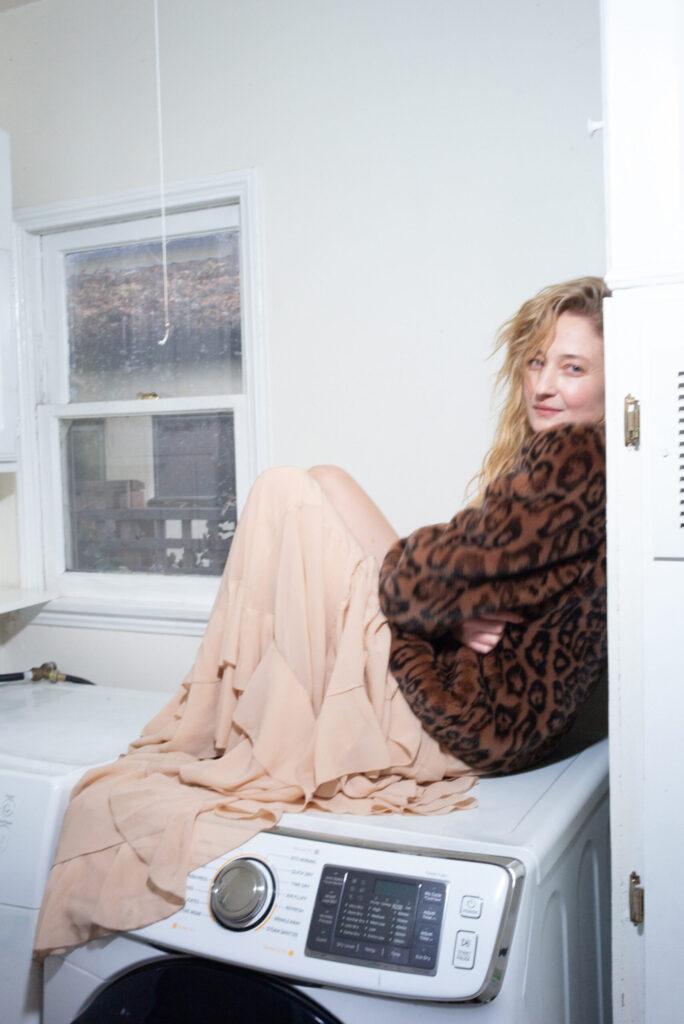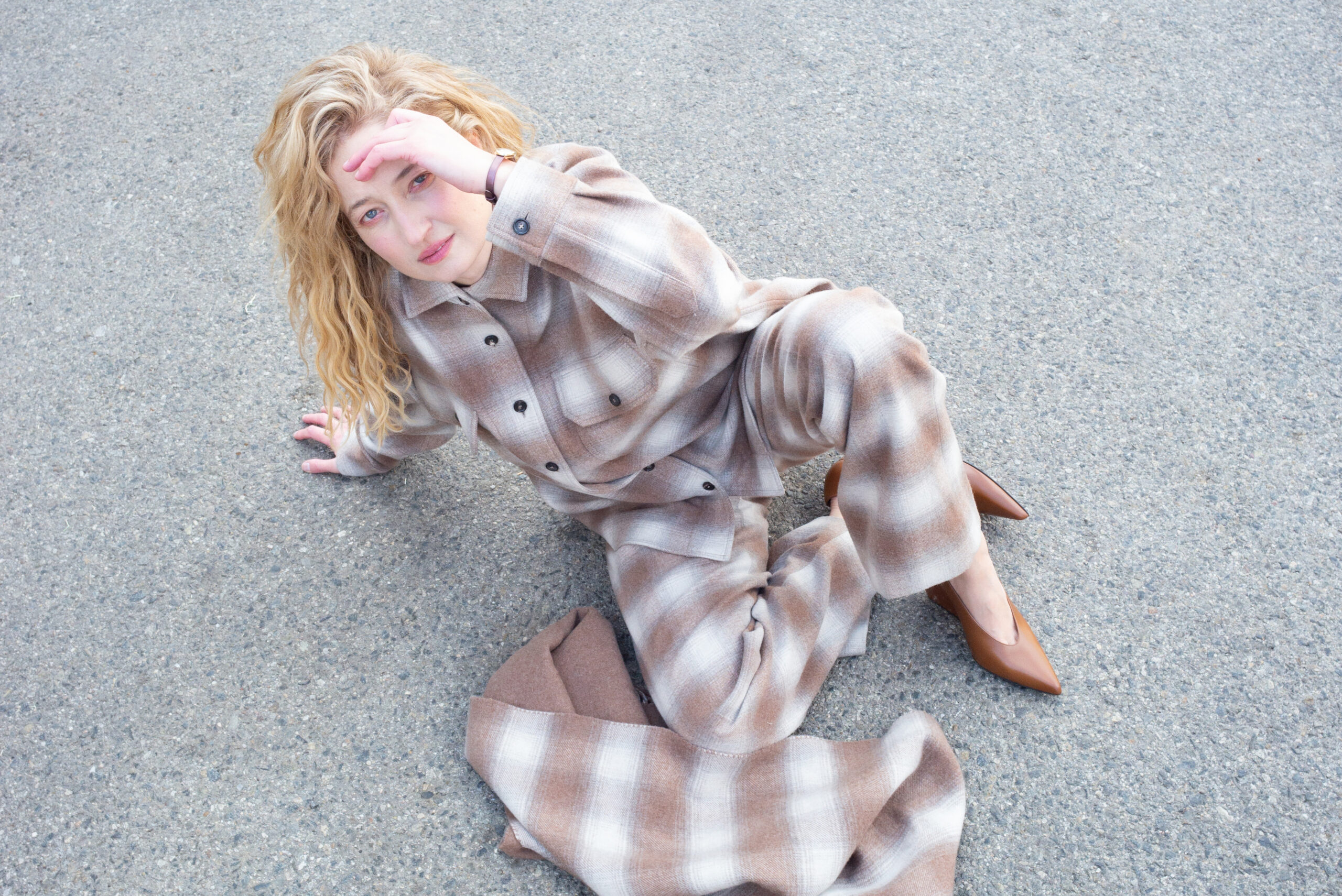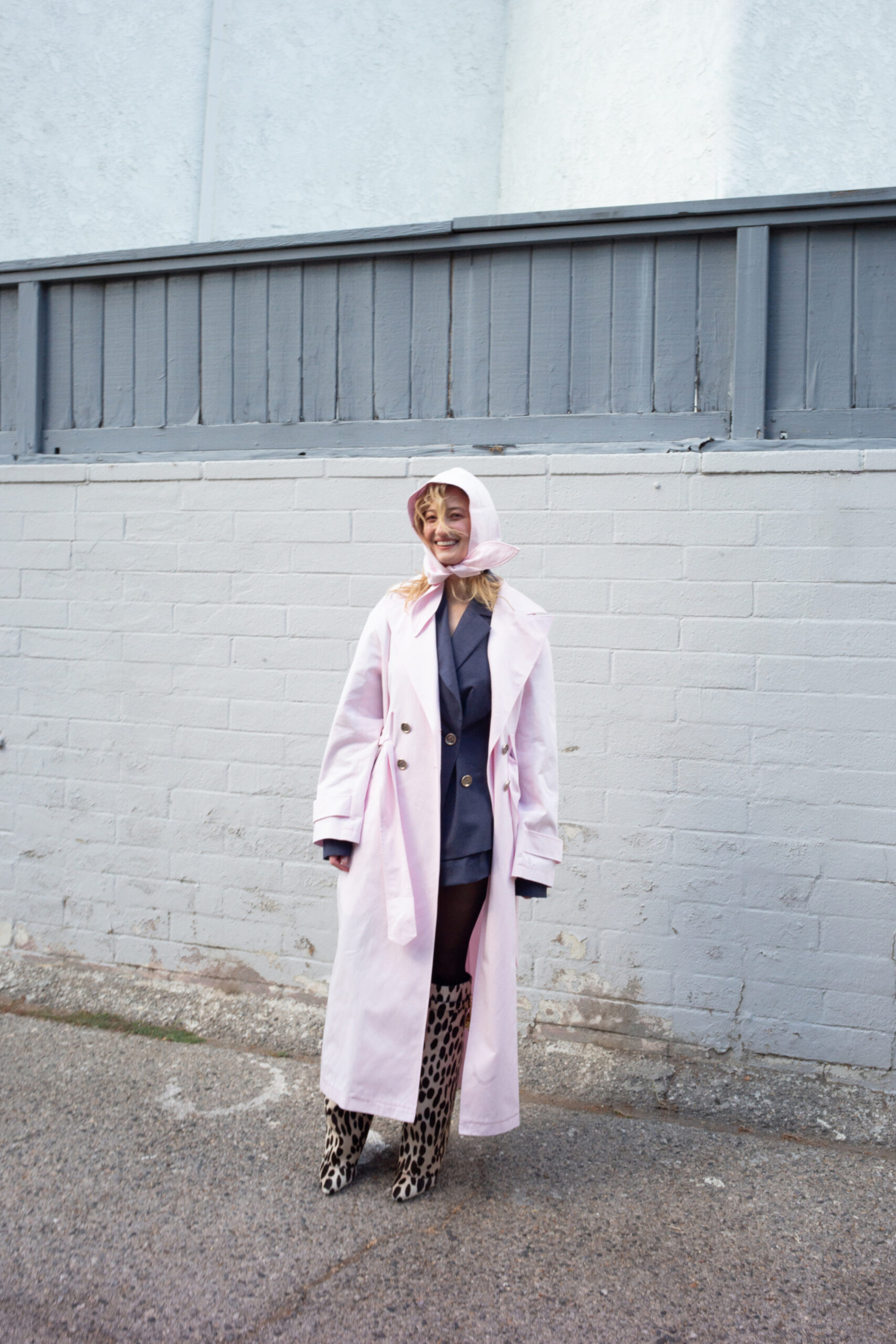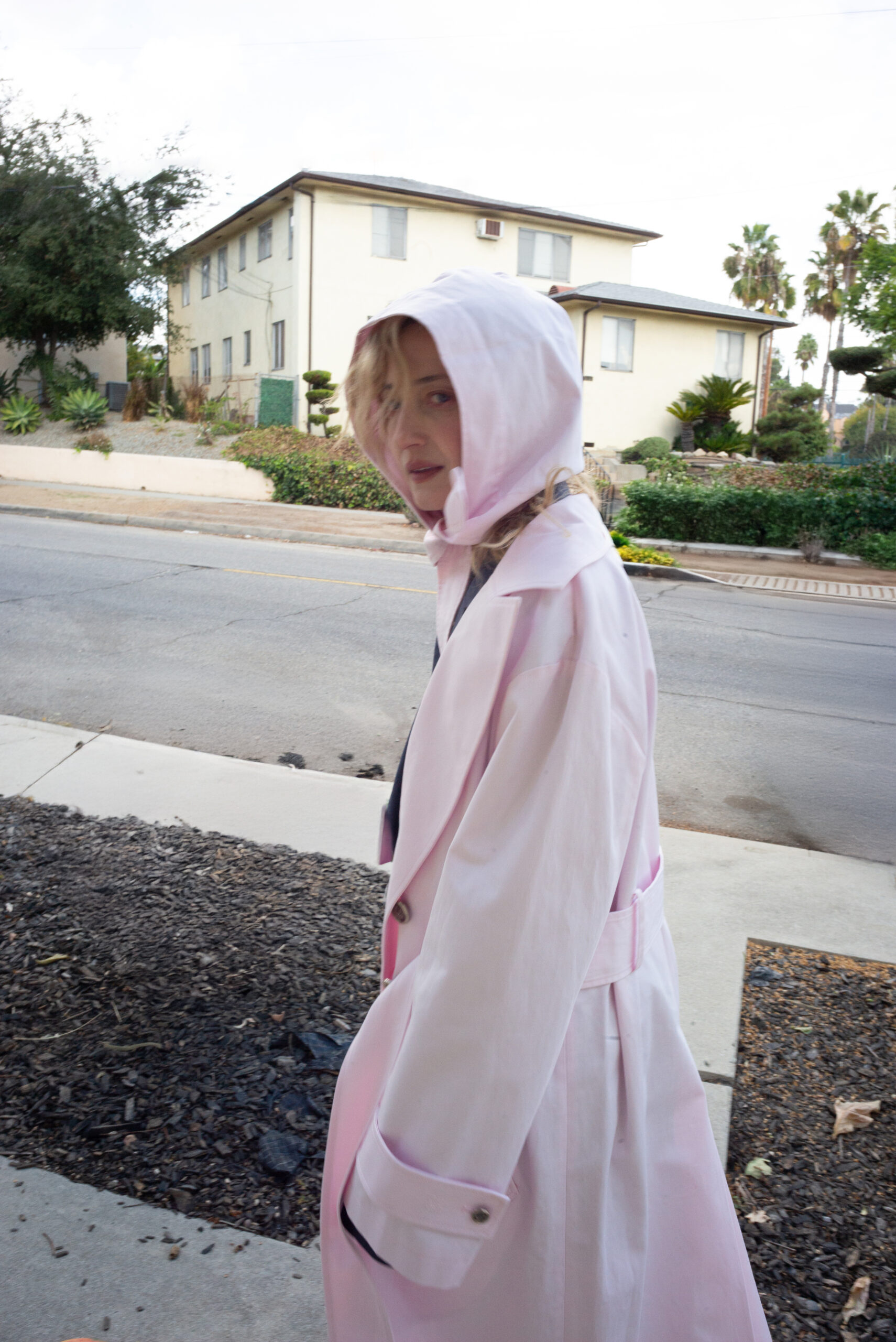Whether performing in a small Roman theater or starring in a major Netflix production like Pablo Larraín’s Maria, Alba Rohrwacher brings intense dedication to every role. “I need to be obsessed with my character,” she tells her friend and former La Chimera co-star Josh O’Connor. “I need to understand the world of the director I’m working with.” In Maria, Rohrwacher transforms into the mysterious Bruna, the devoted assistant to tragic opera legend Maria Callas, played by Angelina Jolie. Though Bruna remains in the shadows during Callas’s turbulent final days, she’s a quiet yet constant guardian angel, emanating a caring spirit that comes naturally to Rohrwacher. In her conversation with O’Connor below, the actor discusses her long-awaited collaboration with Larraín, her instinctual need to perform, and why she still identifies with the shy girl who once dreamed of joining the circus.
———
JOSH O’CONNOR: Hi, Alba.
ALBA ROHRWACHER: Ciao, Joshy. Joshualino! Where are you?
O’CONNOR: I’m in New York now.
ROHRWACHER: Okay. I’m in Rome, but you can’t see outside because it’s dark.
O’CONNOR: Oh, gosh. Listen, we’ll have a proper conversation as friends, Alba. It’s funny talking to you as my interviewer self. We have La Chimera, which came out earlier this year, which is our special bond.
ROHRWACHER: The way we became a family.
O’CONNOR: But also, Maria. You shot Maria after La Chimera.
ROHRWACHER: Yes, because after La Chimera, I had the journey with My Brilliant Friend, then I had Hors-Saison, the French movie I told you about, then there was Maria maybe one-and-a-half years after.
O’CONNOR: It’s so strange that they’ve come out in the same year.
ROHRWACHER: Yeah. This is the life of cinema.
O’CONNOR: Did you know Pablo [Larraín] before?
ROHRWACHER: No, but 15 years ago, I was at the Torino Film Festival as a juror [seeing] Tony Manero, which was the first movie he did. Do you know the movie?
O’CONNOR: I don’t think I do, wow. This is before Jackie.
ROHRWACHER: Yes. It was the first movie he did. We were so impressed, especially me. I’d say he’s really a visionary director. We decided to change the rules of the festival and give him the first prize, but also the best actor prize.
O’CONNOR: Wow.
ROHRWACHER: Then I went back to Rome and I started to talk to everybody about this movie. It was about Chile and Pinochet, the dictator, and this strange character that’s obsessed with Tony Manero. Then somebody told me, “Why are you not writing him a letter?” But because I’m so shy, I said, “Never, I can’t.” Then for the first and only time in my life, I wrote a small email to him because I had his contact from the jury staff, and just said, “I was in the jury and I loved your movie, your vision is just incredible.”
O’CONNOR: Yeah.
ROHRWACHER: He never replied. 15 years later, he called me and said, “I want you to be part of this story.” Then I went to the meeting, and once we were already in the work, I said, “You know that 15 years ago I wrote you.” He said, “No way,” and he went and found the letter.
O’CONNOR: We have exactly the same story because I wrote to Alice [Rohrwacher] and she never received the letter. And I didn’t know how to find her, so I wrote a letter to you.
ROHRWACHER: I never received your letter.
O’CONNOR: Yeah, you never received it. Neither did Alice. I’m a big advocate for writing to directors and actors and things, but most of the time—
ROHRWACHER: Did you do it often?
O’CONNOR: A bit. I still do it now. I recently wrote to Daniel Day-Lewis, but because now I know where he lives I just put it in his door. I still don’t know if it was his house. I couldn’t remember the exact address. Maybe he’ll find it. But I believe in it a lot.
ROHRWACHER: I don’t know.
O’CONNOR: If I was a director and I received a letter from you, I’d be like, “We’ll write everything for her. We’ll get her in.”
ROHRWACHER: I don’t know, I’m too shy. I did once and it was like a cosmic, magic situation.
O’CONNOR: That’s what I believe. You put it into the world and you manifest it. Maria Callas, did you know much about her? How did it happen? He got in touch with you with a script?
ROHRWACHER: Yeah, he called me through the agent to their production. Then he sent me the script, which was incredible. Steven Knight wrote it.
O’CONNOR: Oh, yeah, he’s amazing.
ROHRWACHER: It was interesting to me how he portrayed the last week of the life of Maria Callas, and also how they introduced the Mandrax as the bridge from reality to the possibility. I was very moved by the script. Of course, I knew a lot about Maria Callas because especially in Italy and Greece, she is a legend. Thanks to her, opera broke many doors and became something that the public could accept. I knew about some painful stories, but I didn’t know everything, and of course I didn’t know anything about Bruna and Ferruccio, this trio, so it was interesting to discover the human side of her.
O’CONNOR: I’ve only done it once in my career with The Crown, playing a real person. It doesn’t interest me or excite me telling a biopic.
ROHRWACHER: Me too.
O’CONNOR: But I think he’s not doing that. It’s like a fairytale. He did the same with Diana [in Spencer], he did the same with Jackie and with this movie. He takes someone’s life and makes it seem mysterious. It’s accepting the mystery, and I think that’s the biggest problem with making biopics. It’s like what Todd Haynes did with I’m Not There, the Bob Dylan biopic.
ROHRWACHER: Yeah.
O’CONNOR: It’s a great example of basically saying, “We don’t know who Bob Dylan is.” You think Dylan is the poet, the artist, the songwriter. Rather than try and tell his life, let’s accept that we don’t know. Pablo Larraín does the same thing.
ROHRWACHER: I can recognize myself in the pain of Maria Callas, even if my story is completely different, or in the loneliness of Princess Diana. This is cinema. That’s why I wrote this letter 15 years ago, because it was clear to me immediately that he was someone with a point of view, which for me is why I’m doing this work. My dream is to work with people that can tell a story, a fairytale, but in a specific way.
O’CONNOR: With an opinion.
ROHRWACHER: Yes, with a view which is unique.
O’CONNOR: How is he to work with as a director? Because I know how you work and you’re one of the most spiritually attuned actresses I know. The one time so far we’ve worked together, you came in for this short period, but you were full of questions. You don’t rest with a character, you’re always pushing that character, and you can see it in your performances. What’s Pablo Larraín like? Does he want more of that?
ROHRWACHER: He’s very precise and he knows what he wants. I don’t know how to explain it. That’s why it works, because there is also mystery in the relationship between people and the understanding between people without a recipe. I immediately understood what he was looking for.
O’CONNOR: Yeah.
ROHRWACHER: I arrived in Budapest and we did the movie mostly in Budapest, a little bit in Paris, two days in Milano. Everything was built.
O’CONNOR: Like a set.
ROHRWACHER: A set. I entered his room, where he was preparing everything, and the room already was like a piece of art because it was this big, big room with a table in the middle with books and computers, but all the walls were completely covered, like a mosaic of all the images of Maria Callas that he collects. It was only images of her, pieces of letters, and paintings that for him were the references. We started working together on this movie about the last seven days of Maria Callas, and I discovered Bruna because in just a few images, there was this tiny ghost, a guardian angel, always with the eyes low, very humble and gentle, but always four steps behind her. From that moment, slowly I started [understanding] this person who is a presence, someone that recognizes the strength of someone else. Maybe she didn’t really understand opera, but she put her life behind someone, and she gave her life for someone. I don’t know if I answered your question.
O’CONNOR: Yeah, that makes sense.
ROHRWACHER: We started working, but it was natural.
O’CONNOR: This is a wider question because the fun thing about speaking to you is I get to ask you questions that I normally wouldn’t ask. I think you and Alice both have this very special gift. I often will ask Alice something about the world to get an interesting insight into her perspective on things. You’re the same for me. I wondered why you are an actor and what it is that attracts you, because I know a little bit about your upbringing, but I’m interested how that came to acting.
ROHRWACHER: It’s an immense question and it’s something very mysterious to me. It’s necessary to find the possibility of my life through others’ lives, to find the reason for me through other people. I wasn’t the girl doing the poetry in front of everybody at Christmas, I was very shy. If you see all my pictures when I was a child, I was always trying to hide myself. I was very mysterious. It was a treasure, but I didn’t know about it. I had a feeling about working in a circus, working with my body. It was a tension that I had, but I didn’t say it to anybody. It was my secret, a mysterious necessity.
O’CONNOR: Yeah, a need. Now in Italy, you are this queen of the acting profession, and very much in the rest of Europe and America. I wondered if you feel differently now having done it for so long.
ROHRWACHER: Never.
O’CONNOR: Really?
ROHRWACHER: But Josh, do you feel different? For me, it’s never changed.
O’CONNOR: No, I feel different now. I think it changes. The truth is that there is something inside me that I don’t understand. I think that, maybe, is true of everyone. We are all striving to understand ourselves a little bit better, but now I feel that there is a change because we spend so much time focusing our attentions on another character that there’s an element of, “Well, what are my insecurities? What are my difficulties? What are my fears?” I find that the cost of playing someone else is much greater now. Early on, I was able to give my whole self to something, and now I have to be more thoughtful about when I do it and when I don’t to protect myself. To be fair, you have always chosen work very carefully and you’re very thoughtful and methodical about roles, so maybe you’ve protected yourself in that way. I don’t know.
ROHRWACHER: Yeah. Maybe it’s by instinct, but if I don’t believe in the vision of a director, if I don’t believe in the character, I can’t do it. I really need to find a very important reason for me to be part of this journey. Maybe this is the way I can protect myself a little bit.
O’CONNOR: Yeah.
ROHRWACHER: Twenty years ago I finished the National School of Cinema which was the Centro Sperimentale, and from that point I started to work in the smallest theater of Rome with our company. For me, this has not changed. My approach to the work is exactly the same as in the smallest theater in Rome with my friends in the Pablo Larraín film with Angelina Jolie. Maybe it’s a problem, but I have the same feeling.
O’CONNOR: I understand.
ROHRWACHER: Did I answer your question?
O’CONNOR: Yes, you did, Alba, so beautifully. This is why I asked you because we don’t talk about acting very much, we mostly talk about life. When I do speak to you about acting, we have an amazing conversation. I don’t know if you remember this, but when we were doing La Chimera, the first half of the movie in the winter, we went over to someone’s house for some food and we stood in the garden looking over Lake Bolsena, and you and I were talking because I was about to work with Luca [Guadagnino] and obviously you know Luca very well, and I was working with your sister. It was one of the most inspiring conversations I’d had in a very long time. How has it been doing a movie that is so big with a Hollywood A-list actor and Netflix and taking it around the world?
ROHRWACHER: I don’t know. I was focused on the work as everybody, as Pablo, as Ed Lachman, as Angelina, as Pierfrancesco [Favino].
O’CONNOR: Well, let me tell you the reason I ask.
ROHRWACHER: Yeah.
O’CONNOR: It’s because of course that’s all become part of our job, but we are not necessarily skilled at it. You mentioned when you were a child, and I’ve seen some of these pictures from when you and Alice were children, and it’s always Alice here and then you’re kind of in the background. Knowing you as an actor, when you’re in the scene, you are so present, but you’re quite a shy, quiet, thoughtful person. Talking about your work is a very different skill for someone who doesn’t necessarily want to be the front and center of everything. Is that difficult?
ROHRWACHER: Maybe this is my contradiction, Josh. I have the feeling there is the space of the work where I find the reason for my choices, and also for the life I choose to build. We found each other also in that space, and Alice has the same. We grew up working every day because our father is a worker and our mother too, so it was a place of concrete work where we could find our voice maybe in a stronger way compared to any life situation.
O’CONNOR: That’s very true. And about growing up working with your father, anyone who has not seen Le Meraviglie, The Wonders, it’s a beautiful film to see Alba in her full glory. Anyone who’s reading this, you have to see Maria, yes, and then go and see Le Meraviglie, The Wonders. They’re both very, very, good. Then you understand why she’s the way she is.
ROHRWACHER: Right.
O’CONNOR: What’s next? Do you still have to travel to talk about Maria for a while?
ROHRWACHER: No. But in one week, I’m moving to Paris. I’m happy because I started something there. I have to study a lot, but I am happy because I’m a worker.
O’CONNOR: Exactly. This is why I think you’re so special because that worker instinct you have is so a part of you as an actor. You are such a hard worker.
ROHRWACHER: You too, Josh, I think we share this. We are very generous with the work we choose because we need to be completely involved. I need to be obsessed with my character. I need to understand the world of the director I’m working with so I could be part of it. I have the feeling you are the same.
O’CONNOR: Yeah, but for me, hard work isn’t the thing.
ROHRWACHER: No, because it’s not about being precise.
O’CONNOR: Not at all. If anything, there’s an acceptance of imprecision. It’s like an acceptance of chaos. You are the most beautiful example of that, of accepting that we don’t know the answers to certain things. When I say hard work, it’s not about finding precise answers.
ROHRWACHER: No.
O’CONNOR: You never do. It’s actually the opposite.
ROHRWACHER: Yeah. It’s not about doing a good job. I believe in the potency of sharing something very honest, sharing a truth.
O’CONNOR: Maybe it’s actually your ambition of being in a circus. I think maybe you found that in a different way.
ROHRWACHER: Yeah.
O’CONNOR: Making a movie is very similar to being in a circus. We travel around, we have each other’s hands, we are trying to celebrate each other’s skill and talent. You’ve made it, Alba. You are in the circus.
ROHRWACHER: Yeah. My dream was to be an acrobat, because there is a risk.
O’CONNOR: You are the acrobat.
ROHRWACHER: Like you, Josh. I want to ask you something.
O’CONNOR: You don’t have to ask me anything.
ROHRWACHER: I want to ask you about when you were a child, what was the first step that allowed you to this possibility?
O’CONNOR: For me, it was a very strange one because you know about my grandmother who I was very close with, the ceramicist. She was a big inspiration in my life. She had a brother who died relatively young, but fortunately I did know him a little when I was very young, and he lived on the south coast of England in a beautiful house. It had a river running through it and a rope swing. It’s a very small village, and in England we have this Christmas time celebration, a theater event called Pantomime, which is probably inspired by Commedia Dell’arte, and it’s this kind of slapstick comedy performance where the audience would scream back at the actors. You would go and see the show in the village. My great uncle was in this show, and they make their own costumes and they have these big head pieces. It’s like a circus. It was this magical exciting feeling. I was maybe seven years old, but I remember thinking that it was the most exciting thing. The relationship between the people on the stage and the audience watching them felt like the most vivid relationship. Then, I couldn’t do very much else. It’s like you said, it’s like a need. Maybe I’ll do it for a little longer and then I’ll be a ceramicist again.
ROHRWACHER: You will be the ceramicist and I will be your assistant.
O’CONNOR: Perfect. This is where we’re heading.
ROHRWACHER: In Umbria. I will go to the little market.
O’CONNOR: The perfect life for us. Thank you so much for letting me ask you all these questions. It’s so funny and special because Alba’s like a sister to me.
ROHRWACHER: I had so many moments speaking with you, really going deep.
O’CONNOR: Yeah. We go to the depths. Loads of love, Alba.
ROHRWACHER: Ciao, ciao.
———
Hair: Jenny Cho.
Makeup: Nicoletta Pinna.




